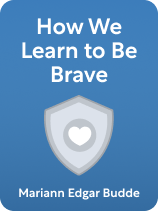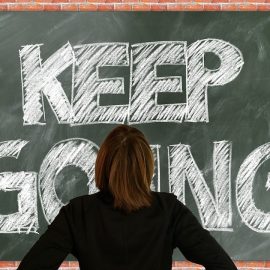

This article is an excerpt from the Shortform book guide to "How We Learn to Be Brave" by Mariann Edgar Budde. Shortform has the world's best summaries and analyses of books you should be reading.
Like this article? Sign up for a free trial here.
Is bravery something we’re born with, or can we actually learn to become more courageous? What if the moments that require the most courage aren’t the dramatic ones we see in movies?
How We Learn to Be Brave by Mariann Edgar Budde offers a fresh perspective on developing courage. The Episcopal bishop argues that bravery isn’t a rare gift reserved for heroes—it’s a skill anyone can develop through practice and intentional choices.
Read more to discover how small daily decisions build the foundation for life-changing courage and why being brave might be more accessible than you think.
Overview of How We Learn to Be Brave by Mariann Edgar Budde
Published in 2023, How We Learn to Be Brave by Mariann Edgar Budde explores the nature of courage and how we can develop it throughout our lives. Her central thesis is that courage isn’t an innate quality that only a few extraordinary people have, but a capacity we can all cultivate through deliberate practice and choice. Budde examines the “decisive moments” we all encounter—times when we must actively choose to go in a new direction, stay committed to our path, accept difficult circumstances, or step up to accept an opportunity—and she shows how these moments shape who we are and who we become.
Budde is the first female Episcopal Bishop of Washington, D.C., a position she’s held since 2011. She gained international attention in 2020 when she spoke out against President Donald Trump’s use of St. John’s Episcopal Church as a backdrop for a photo opportunity after White House protesters were tear-gased in Lafayette Square. In 2025, she urged Trump to exercise compassion for immigrants and members of the LGBTQ+ community. Drawing on her experiences as a leader who has made difficult choices and taken public stands, Budde illustrates how courage develops in ordinary and extraordinary circumstances alike.
Our guide organizes Budde’s insights into three sections: what bravery is (and what it’s not), why cultivating courage matters, and how we practice and sustain courage over time. Along the way, we connect Budde’s vision of courage with ancient Greek concepts of bravery, explore the neuroscience behind courageous decision-making, and examine how learning to be brave correlates to other facets of identity development.
| Understanding the Episcopal Church As the US branch of the Anglican Communion (which formed when the Church of England separated from the Roman Catholic Church), the Episcopal Church occupies a unique position in American Christianity—which offers context for Budde’s approach to courage. The church is sometimes described as “Protestant, yet Catholic” in its traditions, and in recent decades, it has become increasingly progressive on issues like LGBTQ+ inclusion, environmental advocacy, and social justice. Since the 1970s, the church has come to several controversial decisions, like the ordination of women in 1974 and the full inclusion of LGBTQ+ members, that epitomize Budde’s emphasis on making brave choices despite the fallout. Tension over these social issues has emerged between the church’s progressive leadership and its more ideologically diverse membership. Episcopal clergy tend to be significantly more liberal than their congregations, a dynamic that produces situations where leaders like Budde must make difficult choices that don’t align with all of their members’ views. Observers note the church has faced declining membership as it’s taken more progressive stances—which Budde might say illustrates the consequences of taking a principled stand. The decline in membership reflects similar patterns affecting other mainline Protestant denominations and highlights the challenges of maintaining institutional courage when facing potential losses. |
What Bravery Is (and Isn’t)
In this section, we’ll explore Budde’s understanding of courage—what it means to be brave, how courage develops over time, and why we all have the capacity for bravery, even if we don’t recognize it in ourselves. By understanding the nature of courage, we can begin to see how it manifests in our lives and how we might cultivate it more intentionally.
Courage Is a Conscious Choice in Decisive Moments
At the heart of Budde’s understanding of courage is that we all experience “decisive moments”—turning points in our lives when we exercise agency rather than operating on autopilot. These moments might involve deciding to go in a new direction, stay committed to our path, start something new, accept difficult circumstances, or take advantage of an opportunity. Decisive moments involve making a deliberate choice when something significant hangs in the balance. Budde explains that we’re aware of the importance of these moments as we experience them. We’re not just reacting to our circumstances, but actively participating in shaping our future.
Budde explains that one of the most persistent myths about courage is that it appears suddenly in those who happen to have it. But that’s not how it works in real life. Instead, Budde argues the bravery we exercise in decisive moments represents the culmination of a lifetime of smaller choices. Consider the bishop who stands up to a president, the civil rights activist who marches despite threats, the parent who supports their child’s difficult journey—these acts might appear spontaneous, but they express values and practices cultivated over time. The courage we witness in these moments took shape decision by decision, challenge by challenge.
This understanding transforms how we might view courage in our own lives. Rather than waiting passively for a dramatic moment to reveal whether or not we have bravery, we can cultivate courage by making everyday choices that align with our values. When we recognize that courage is something we learn through practice, we open ourselves to the possibility that anyone can develop the ability to act bravely when it matters most.
How Courage Reveals Our Character and Values
Budde explains that the moments when we choose to be brave serve as windows into our true character and values. When faced with a significant choice, the path we select reveals what we believe and care about, sometimes in ways that surprise even us. Such moments arise when our values come into conflict—for example, when loyalty to one commitment requires breaking another, or when standing up for what we know is right demands a significant sacrifice. By navigating these tensions, we discover and demonstrate who we are.
Budde shares the story of Henry Caffey, a Black railroad worker in Alabama during the Civil Rights Movement. When Caffey’s daughter wanted to participate in the march from Selma to Montgomery, he faced a choice. He could either support her and risk losing his job, or discourage her involvement to protect his career. His choice to drive her to the march revealed his values of dignity, justice, and support. Most of our brave moments might not be as historically significant as Caffey’s, but they’re no less revealing of our character. Whether we’re choosing to speak an uncomfortable truth, remain faithful to a difficult commitment, or take a stand against injustice, our responses in these moments compose the narrative of our lives.
We All Have an Inherent Capacity for Bravery
A cornerstone of Budde’s approach is her belief that we all already possess the raw materials for bravery. The problem isn’t that we lack courage: It’s that we often fail to recognize and access the courage we already have. The challenge is to recognize that this potential exists and to develop the awareness and skills to draw upon it when needed.
Part of this recognition involves acknowledging our vulnerabilities and limitations. Contrary to popular belief, courage doesn’t require fearlessness or perfect confidence. In fact, bravery often emerges when we acknowledge our doubts and proceed anyway. Understanding courage in this way—as a capacity we can develop rather than a trait we either have or lack—empowers us to approach occasions that call on us to be brave with greater confidence. We can learn to be brave not by trying to transform ourselves into someone else, but by fully becoming who we already are.
Why Cultivating Courage Matters
Courage isn’t just something we admire in others—it’s a vital capacity that enables us to live with meaning, purpose, and integrity. Budde explores why developing our ability to be brave matters for both our personal growth and our impact on the world.
Courage Helps Us Make Choices That Change Our Lives
The pivotal choices we make shape who we are and who we become, and our decisions alter the trajectory of our lives. As Budde explains, when we choose to act with courage, we often unlock hidden strengths and discover new possibilities we couldn’t previously imagine. These brave moments look different for everyone. For some, it might mean speaking truth to power or standing against injustice. For others, it might involve leaving a comfortable job to pursue a calling, committing to a challenging relationship, or facing difficult circumstances with dignity.
The power of these choices lies in their ability to change us from the inside out. They not only transform our external circumstances but also remake our internal landscapes—how we understand ourselves and our place in the world. Also, the ripple effects of our choices extend beyond our own lives. When we act courageously, we can inspire others, challenge broken systems, and create positive change in our communities. By developing courage, we expand our capacity to contribute to the world in meaningful ways.
Courage Allows Us to Live Authentically
At its heart, courage enables us to align our actions with our values. Budde contends that without bravery, we often default to choices based on fear or convenience rather than conviction. Cultivating a strong alignment between who we are and how we live plays a fundamental role in our well-being and sense of fulfillment. When our actions consistently contradict our values, we experience what psychologists call “cognitive dissonance,” an uncomfortable internal conflict that generates anxiety, guilt, and dissatisfaction. Budde explains that courage helps us resolve this discord by choosing integrity even when it’s difficult.
Budde emphasizes that living authentically requires honest self-awareness and the willingness to act on what we discover when we look inward. We need to understand what matters most to us and then choose to honor those priorities in our actions. This might mean speaking an uncomfortable truth, setting boundaries in relationships, or taking risks to pursue what’s meaningful. Authentic living doesn’t require us to never experience fear or doubt. Rather, it means we develop the capacity to acknowledge these feelings without being controlled by them. As Budde notes, we find courage not in the absence of fear but in our determination to move forward despite it—choosing what’s meaningful over what’s comfortable or safe.
Courage Creates a Path to Personal Growth
Budde points out that a crucial connection exists between courage and personal development. Without the willingness to be brave—to face challenges, embrace vulnerability, and step into the unknown—we constrain our growth. Whether we’re developing new skills, deepening relationships, confronting personal weaknesses, or pursuing ambitious goals, growth requires us to risk failure and face our fears. Budde contends that each time we choose courage over comfort, we open doors to development that would otherwise remain closed.
This relationship works both ways: Courage enables growth, and growth empowers us to be courageous. As we overcome challenges, we build confidence in our ability to face future difficulties. Each brave choice creates a positive cycle where courage leads to growth, which in turn makes future courage more accessible—and helps us become wiser and more resilient.
Budde also understands that in addition to being a personal virtue, courage is a spiritual practice and a tool for effecting social change. She explains that courage helps us transcend our individual concerns and connect to something larger than ourselves, enabling us to make choices that serve not only our own interests but the common good.
How We Practice and Sustain Courage
Understanding courage in theory is valuable, but Budde’s most important message is practical—how to develop bravery and maintain it throughout our lives. In this section, we’ll explore her guidance for building courage through daily practices, developing key virtues, navigating different types of challenging moments, and handling what happens after making brave choices.
Build Courage Through Small, Daily Decisions
Budde explains that when a critical moment arrives, we rarely have time to deliberate. Instead, we respond based on the habits and values we’ve already developed. With consistent practice, courageous choices become more natural because each small act of bravery builds your capacity for integrity and courage. To strengthen your ability to be brave, Budde says:
- Pay closer attention to the small choices you face and what they say about your values.
- Identify patterns that connect situations where you tend to choose comfort over courage.
- Deliberately make the braver choice, even when it feels uncomfortable.
- Speak up when you witness something wrong.
- Take responsibility when you make mistakes.
- Embrace new challenges that stretch your abilities.
- Let go of grudges that hold you back.
- Be more honest and vulnerable with others.
- Learn from failures rather than avoiding them.
Develop the Virtues That Support Brave Choices
Courage doesn’t develop in isolation but grows alongside other qualities that support it. Budde identifies several key virtues that create fertile ground for courage to flourish:
Perseverance keeps us going when obstacles arise. Budde explains that while perseverance doesn’t have the drama of our initial brave choices, it’s essential for those choices to bear fruit. Without the ability to persist through difficulties, our brave beginnings often fizzle out when we face resistance.
Acceptance means embracing reality as it is, including difficult circumstances we can’t change. Paradoxically, accepting what we can’t change creates space for meaningful action where we do have influence. It prevents us from wasting energy fighting reality and instead helps us adapt creatively.
Faithfulness is about showing up consistently for our commitments and relationships, even when it’s difficult or our motivation is low. This steady dedication builds trust and integrity while creating stability in our lives and communities.
Humility allows us to recognize both our strengths and limitations. It keeps us open to learning, receiving guidance, and growing from our mistakes. Humble courage strikes the right balance between confidence and openness.
Self-awareness helps us understand our values, fears, and patterns of behavior. This understanding is crucial for making choices that align with our true selves rather than letting ourselves be driven by unconscious fears or external pressures.
To develop these supporting virtues, Budde says:
- Set realistic goals and celebrate small wins to build perseverance.
- Practice mindfulness to increase acceptance of your present reality.
- Establish routines that support the consistent fulfillment of your responsibilities.
- Seek feedback and mentorship to cultivate humility.
- Engage in regular reflection to deepen self-awareness.
- Surround yourself with role models who embody these virtues.
Take a Practical Approach to Different Types of Decisive Moments
Life presents us with various situations that call for courage, and each type requires a somewhat different approach. By understanding these different scenarios, you can respond with the right kind of courage when they arise. Budde offers guidance for handling five common scenarios that demand bravery:
When it’s time to go: Sometimes courage means leaving—a situation, relationship, or commitment that no longer serves your highest purpose. This requires facing uncertainty and the discomfort of new beginnings. Budde advises careful decision-making rather than an impulsive reaction, honoring what has been while embracing what could be, taking responsibility for your departure’s impact, and facing the unknown with hope.
When it’s right to stay: While leaving often seems like the brave choice, sometimes the greater courage lies in remaining where you are and going deeper. This means recognizing when your work is unfinished and embracing the challenges of constancy rather than seeking escape. Budde encourages “leaning into” your current life, finding meaning in daily faithfulness, and discovering growth opportunities within existing commitments.
When you need to start something new: Beginning a new venture requires a kind of courage that combines vision, initiative, and willingness to risk failure. Budde suggests moving forward despite uncertainty, being willing to adapt as you go, accepting imperfection as part of the process, and remaining open to unexpected directions.
When you face circumstances you didn’t choose: Some of life’s most significant growth comes through difficult situations we didn’t ask for. Finding courage in these moments involves practicing radical acceptance, staying present rather than escaping through denial, treating yourself with compassion, and sharing your authentic experience with people you trust.
When you’re called to step up: When opportunities align with your strengths, courage means embracing them with the appropriate amount of confidence. This involves recognizing your capacities, balancing confidence with humility, approaching challenges with enthusiasm, and maintaining a growth mindset.
Navigate the Aftermath and Integrating Brave Choices
Making a brave choice isn’t the end of the story—what happens afterward is just as important. By thoughtfully navigating what comes after making brave choices, you build a sustainable practice of courage that can serve you throughout your life. Budde highlights two crucial aspects of the aftermath of significant decisions that require ongoing courage:
The emotional letdown: After a significant brave choice, many people experience what Budde describes as an emotional letdown: a swing from their initial euphoria to doubt, emptiness, or even depression. This letdown can make you question whether your decision was right, but understanding that this reaction is normal helps you avoid being derailed by it. To navigate this phase, Budde recommends:
- Anticipating the letdown rather than being surprised by it.
- Staying connected to your original reasons for making the brave choice.
- Resisting the temptation to either retreat from your decision or overextend yourself.
- Allowing time for the significance of your choice to sink in.
- Leaning on supportive people during this vulnerable time.
- Being patient with yourself through the process.
Integration into your identity: For courage to become a sustainable part of your life, brave decisions need to be incorporated into your sense of who you are, rather than remaining isolated events. This integration transforms momentary acts of courage into a courageous way of being. To help with this integration, Budde suggests:
- Reflecting regularly on your decisive moments and what they reveal about your values.
- Allowing your personal story to evolve based on the courage you’ve demonstrated.
- Sharing your experiences with people you trust who can help you process their meaning.
- Applying insights from past experiences to future challenges.

———End of Preview———
Like what you just read? Read the rest of the world's best book summary and analysis of Mariann Edgar Budde's "How We Learn to Be Brave" at Shortform.
Here's what you'll find in our full How We Learn to Be Brave summary:
- How we can develop the courage to make choices we’ll be proud of
- The small, daily decisions that can build your capacity to act bravely
- Why courage is required to live a life of authenticity and fulfillment






